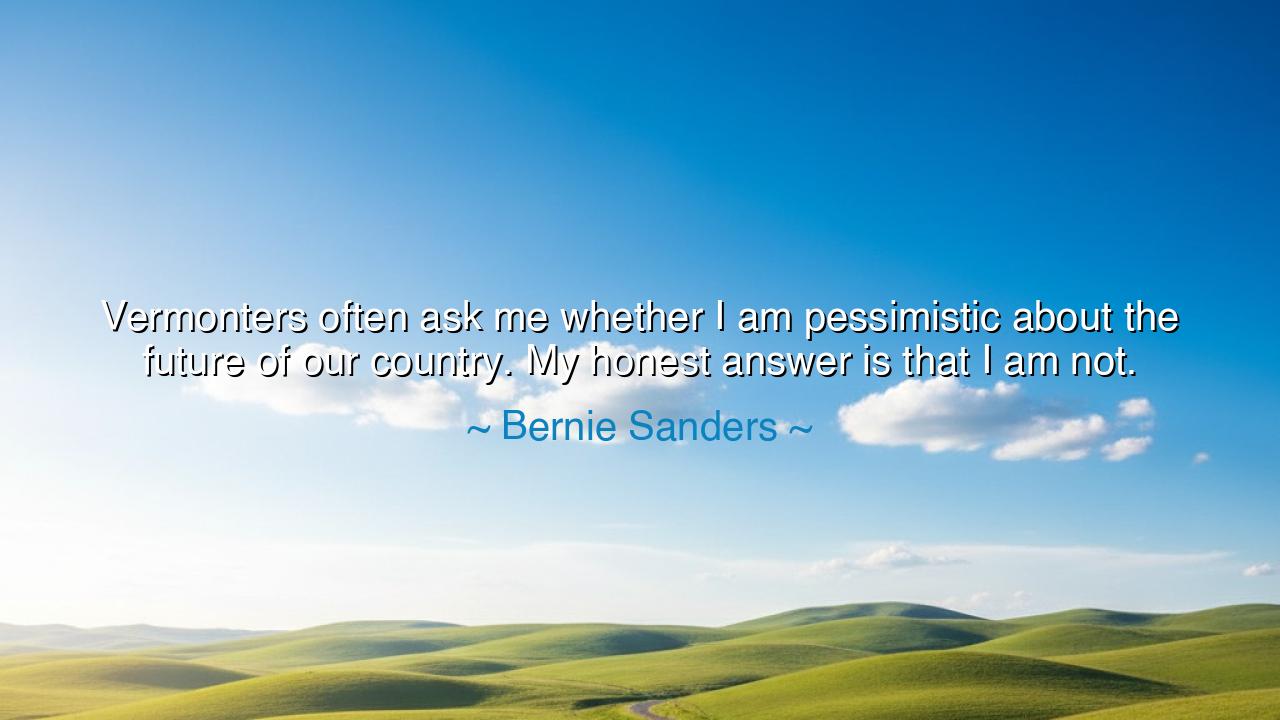
Vermonters often ask me whether I am pessimistic about the future
Vermonters often ask me whether I am pessimistic about the future of our country. My honest answer is that I am not.






In the vast expanse of human history, there are moments of great uncertainty—times when the future seems shrouded in shadow, and the hopes of the people are tempered by the weight of their struggles. Bernie Sanders’s words, "Vermonters often ask me whether I am pessimistic about the future of our country. My honest answer is that I am not," reflect a wisdom that has been passed down through generations—a reminder that despite the trials we face, there is always hope in the human spirit. In a world that often seems overwhelmed by division, discord, and doubt, Sanders’s statement offers a powerful call to believe in the potential of humanity and the possibility of a better tomorrow.
In the ancient world, philosophers like Socrates and Plato often wrestled with questions of society, justice, and the future of mankind. Socrates, despite the chaos of Athens, believed in the ability of individuals to seek truth and improve the world around them. Plato, in his vision of the ideal society, understood that even in times of turmoil, there was the possibility of creating something better—something more just. Socrates did not succumb to pessimism despite the challenges of his time, and in that, he modeled the belief that hope lies in the actions of the people, in the pursuit of virtue and the truth. Like Socrates, Sanders refuses to be swayed by the fear that so often clouds our vision of the future.
Consider the example of Abraham Lincoln, who, in the midst of the Civil War, faced a nation divided, torn apart by the brutality of conflict and the weight of a seemingly insurmountable crisis. Yet, despite the darkness of the moment, Lincoln refused to give in to pessimism. He believed in the American experiment, in the capacity of the people to come together, heal, and rebuild. His steadfast hope in the future of the nation carried him through the darkest days, and his leadership ultimately helped to bring the country back from the brink of destruction. Sanders echoes this sentiment in his own call for a hopeful future—a belief that despite the challenges of today, there is a better tomorrow that can be created through collective action, courage, and commitment to justice.
In ancient Rome, Cicero wrote extensively about the nature of resilience in times of crisis. He believed that a nation’s strength was not just in its military or its wealth, but in the virtue and resolve of its people. Even in the face of political instability and corruption, Cicero maintained a firm belief in the possibility of reform, of renewal through the actions of the citizens. His philosophy teaches us that while pessimism may seem tempting in times of turmoil, true strength comes from looking toward the future with conviction, believing that the challenges of today are not insurmountable. Sanders, in his refusal to be pessimistic, carries this ancient wisdom forward, encouraging us to act with hope and determination, no matter the struggles we face.
The lesson in Sanders’s words is one of resilience and optimism in the face of adversity. It is easy, in moments of fear and uncertainty, to succumb to despair, to believe that the future is already written, that the challenges we face are too great to overcome. But Sanders reminds us that the future is not a static thing; it is something we shape with our actions, our beliefs, and our collective will. Just as the ancients believed in the power of the people to create a just and virtuous society, so too must we believe in our ability to shape the future through action and commitment.
In practical terms, this means that we must not fall into the trap of fatalism or pessimism when faced with difficult times. It is easy to focus on the obstacles, to get lost in the noise of negativity and fear. But Sanders calls us to look beyond the immediate challenges and see the potential for change and growth. Hope is not a passive belief, but an active force that requires us to engage with the world around us, to fight for what is just, and to work toward the future we desire. Just as Lincoln did in the darkest days of the Civil War, we must take action to ensure that our country—and our world—is shaped by hope and progress rather than by fear and division.
Ultimately, Sanders’s words are a call to action, a reminder that we are the creators of our own future. The power to shape the world lies within each of us, and through our collective efforts, we can transform the challenges of today into the opportunities of tomorrow. As the ancients taught, resilience, hope, and determination are the foundations upon which we build a better future. Let us reject pessimism and embrace optimism, for it is through our actions, our courage, and our belief in each other that we will create a future worthy of the generations to come.






AAdministratorAdministrator
Welcome, honored guests. Please leave a comment, we will respond soon